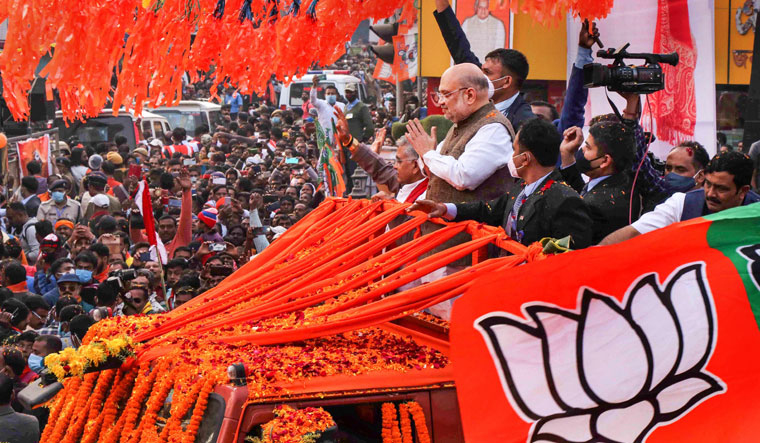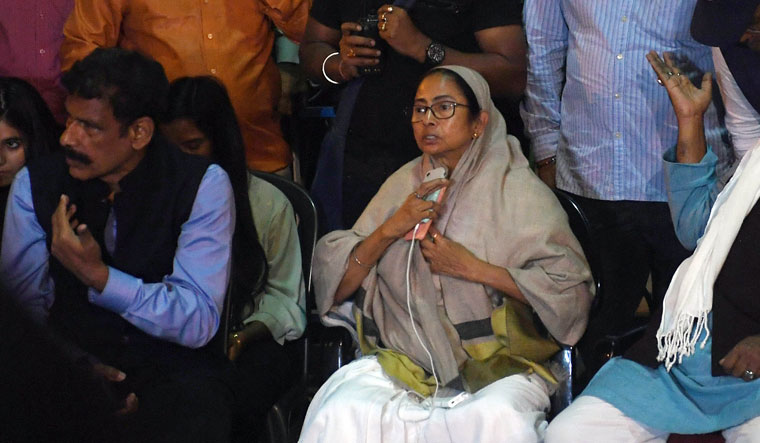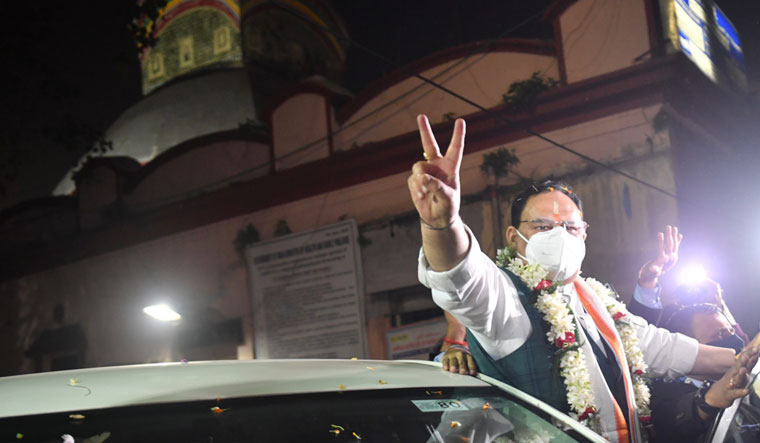On December 11, a day after BJP president J.P. Nadda’s convoy was attacked in Diamond Harbour, in South 24 Parganas district of West Bengal, the state BJP held a meeting with its senior functionaries in Kolkata. It was decided there that “under no circumstances would the [upcoming] assembly elections be allowed to take place under the Trinamool Congress’s administrative control”.
The most vocal demand for President’s rule came from Mukul Roy, the former confidant of Chief Minister Mamata Banerjee. “From what I have seen in Diamond Harbour,” he said, “I can tell you that if President’s rule is not applicable in Bengal, then it should not be imposed anywhere in the country.”
The convoy carrying Nadda and state BJP president Dilip Ghosh, both with Z category security, was attacked under the noses of the state police. BJP national general secretary and Bengal in-charge Kailash Vijayvargiya, senior leader Arvind Menon and state general secretary (organisation) Amitava Chakraborty were badly injured. Near the spot of the attack, West Bengal Minority Affairs Minister of State Giasuddin Molla and Trinamool MLA Saokat Molla were holding a rally against the recent farm laws.
There was a second attack at Sarisa, where Roy’s car was stoned and he was roughed up. That protest was organised by local Trinamool leader Sheikh Zahangir. “You cannot imagine the situation Amitava Chakraborty and I (they were in the same car) were in,” Menon told THE WEEK. “We had a close shave as TMC workers were throwing bricks. We ended up in the local hospital, got treatment and then reached Naddaji’s venue. We were late for the meeting.”
The state government, in its response to Governor Jagdeep Dhankhar, said it was just a reaction of the people and that there were too many cars in the convoy. Dhankhar, unhappy with such “lame excuses”, sent a detailed report to the Centre.
THE WEEK could not reach Saokat or Zahangir. Giasuddin, however, said he and the others could not control the mob because of the unruly behaviour of a BJP leader, Rakesh Singh, who was in one of the cars. “He rolled down the window of the car as some people were waving black flags, and loudly abused Banerjee,” he told THE WEEK. “He also said that he would teach our workers a lesson once the BJP came to power. Hearing this, our workers got angry. They are not highly educated and show [little] patience. Most of them are youth and so they retaliated. Can we not expect the convoy of the BJP president to have more responsible leaders?”
As for the attack on Roy, he said: “I think what they (the BJP) did in [Diamond Harbour] had a lasting impact in Sarisa as well. But I can assure you that neither Saokat nor I were present there. That protest rally was organised by a different person (Zahangir). Our programme was planned well in advance, before we knew of Nadda’s plans. We could not cancel it.”
Dhankhar’s report aside, Union Home Minister Amit Shah sought a report at the party level from Ghosh. And though it is unclear what Ghosh told Shah, Roy was adamant that the “government must go”.
The governor usually sends periodic reports on the state’s affairs to the Centre. Dhankhar, however, has sent four “special reports” to the Union home ministry in the past one year. This included the one in May, which came after Union Minister and BJP leader Babul Supriyo raised the demand for President’s rule in Bengal. Vijayvargiya soon seconded him. Dhankhar had, during the pandemic, rushed to Delhi via Lucknow (direct flights to Delhi had been suspended) to submit the report. Dhankhar, in fact, has taken on Mamata Banerjee at every turn, and has frequently summoned senior state officials to his office.
The Trinamool Congress has rubbished talks of President’s rule, and has also issued threats to the Centre. “Let them take that extreme step,” said Kalyan Banerjee, MP and legal adviser to the chief minister. “They will see what we can do.”
The hostility between the BJP and the ruling party has only intensified during the year, with the former alleging that Trinamool workers have killed 127 of its workers across the state. But, if Roy is to be believed, the actual number is much more.
Building on this narrative, the BJP has claimed that the upcoming state elections would be held under an administration controlled by the Centre, thereby allowing the Election Commission to conduct free and fair elections.
Said BJP national spokesperson Raju Bista: “There is a collapse of the constitutional machinery and the complete breakdown of law and order. Bengal needs to be saved by the Centre. Have you seen how, in Siliguri, BJP worker Ulen Roy was killed in police firing? I do not know what our government would do, but the demand for President’s rule is valid. Elections cannot be held peacefully under this government. We do not know how many people would die in Bengal by then.”
On October 18, Dhankhar told Banerjee in a letter: “We both, as constitutional functionaries, are obliged to serve the people and ensure rule of law, and [I] am sure you will seriously bear this in mind and conform to constitutional prescriptions rather than force a conclusion otherwise, as already we are at the penultimate stage of governance not being carried on in accordance with the provisions of the Constitution….”
Justice A.K. Ganguly, constitutional expert and retired Supreme Court judge, told THE WEEK, “I do not think that West Bengal is a fit case for imposition of President’s rule. The cases of degradation of law and order are happening in many other parts of the country as well. One cannot say that constitutional governance has broken down in Bengal.”
The demand for President’s rule has gained ground because of the alleged politicisation of the administration by the state government. Highly placed sources in the Union government told THE WEEK that the Narendra Modi government decided to take on Banerjee when she hit the streets to prevent the Central Bureau of Investigation from arresting then Kolkata Police commissioner Rajeev Kumar in February 2019, a couple of months before the Lok Sabha elections. Kumar was embroiled in the Saradha chit fund scam. Not only was the CBI stopped from investigating the scam, several of its officers, including the eastern zone chief, were harassed.
In May of that year, the Election Commission decided to transfer top police officials, but the state government resisted. The commission, finding it tough to conduct the polls, curtailed campaigning in parts of Bengal and transferred Kumar.
The Supreme Court is currently hearing a case against many top officers who had allegedly aided Banerjee in her battle with the CBI and the Centre. Many of these officers now hold top posts in the state government.
Another episode that apparently irked the Centre was the state administration’s alleged support to Banerjee’s party during the anti-Citizenship Amendment Act protests. A top officer in the Union government said that Dhankhar submitted a strongly-worded report against some top state officials, including the Kolkata Police commissioner and chief secretary, for featuring in anti-CAA advertisements alongside Banerjee. Dhankhar also accused the state government of using money from the exchequer to fund the party campaign. “That is clearly a deviation from the path of the Constitution,” said the officer, requesting anonymity. “It also showed how a state government machinery can be politicised and used for [helping] a single political party.”
It took an ultimatum from the Calcutta High Court and censure by the Centre, through the governor, for the Banerjee government to stop the ads.
Another confrontation with the Centre, seen by many as a constitutional crisis, took place in the middle of the pandemic this year. The Centre sent teams of officials to south and north Bengal, under the Disaster Management Act, to assess the Covid-19 situation in the state during the lockdown. However, both teams were kept confined to their offices for two days and were eventually allowed to visit some “specific locations” approved by the Banerjee government. The teams, led by senior bureaucrats, reported to the Union home ministry that “top West Bengal officers refused to appear before [us] even when [we] wanted to meet them”.
The Centre-state tussles aside, perhaps what could hurt Banerjee the most is a sensitive issue from the past that Dhankhar has now brought into focus. In 2007, the death of a Muslim man had sent shockwaves throughout Bengal. Rizwanur Rahman and Priyanka Todi had married against the wishes of her father, Ashok Todi, an influential businessman. Less than a month after the wedding, Rahman’s mangled body was found on the railway track. The police said it was suicide; his family rejected the idea.
The incident sparked huge resentment against the ruling left government, and arguably led to a polarisation of the Muslim vote that helped Banerjee win the 2009 Lok Sabha elections. The Trinamool, along with the Congress, bagged 25 of the 42 seats.
Banerjee also built pressure on the state government, forcing it to transfer certain police officers accused of intimidating Rahman at the alleged instance of Todi. Interestingly, Senior IPS officer Gyanwant Singh, one of the shunted officers, was made deputy inspector general of police (Murshidabad Range) in 2014. He was appointed as additional director general of police (law and order) in 2019, and is now known to be among Banerjee’s confidants.
Dhankhar has accused Banerjee of sheltering an “accused officer” against whom she had once launched a movement. A recent letter Dhankhar wrote to Banerjee, a copy of which THE WEEK has, reads: “Apparently in disregard to the procedural requirements and judicial orders, Gyanwant Singh came to be promoted as DIG in July 2014, and as IGP in December 2014. All this even when his conduct was castigated in an unqualified manner in judicial orders indicating that he ‘invaded right to life without authority of law’ and declared that ‘he acted ultra vires and his act was unconstitutional’. Details sought in this behalf are mysteriously denied, now for over a year.”
Neither Singh nor any state official wanted to comment on the matter.
But, does all this mean that the constitutional machinery is broken? Justice Ganguly said that the Centre can issue directions if there is a violation of the Constitution in the state. “I do not think they have issued any direction so far,” he said. “So, I have no idea how the Centre would impose Article 356 (President’s rule) without going through proper methods under Article 355.”
Agreed Congress Rajya Sabha member Pradip Bhattacharya: “First, the Centre would have to act under Article 355 and send a team of officials to assess the situation. Such teams were sent in the past during the rule of the left government also. Without any such reports, Parliament would never accept imposition of President’s rule in Bengal.”
Sujan Chakraborty, a Communist Party of India (Marxist) central committee member, said that any attempt to impose President’s rule would make Banerjee a victim. “This would be the same as giving Banerjee a new life,” he said. “We do not want her to be seen as a martyr. Everyone in the state knows that she would be driven out of power in the coming elections.”
Asked about the alleged politicisation of the administration, Chakraborty said, “Why was the BJP silent about the Narada sting operation? Why did the ethics committee of the Parliament not sit even to take cognisance of the authentic video that showed accused members of Parliament taking money? Why has the CBI been idle in the Saradha scam? People would like to know everything.”
But some opposition leaders say that, if the BJP can abrogate Article 370 in Kashmir, it can surely impose President’s rule in Bengal.
Chakraborty, however, pointed to the fact that Trinamool leaders had anyway been deserting Banerjee. According to Trinamool sources, apart from Suvendu Adhikari (who recently joined the BJP), several legislators were waiting to switch sides.
Banerjee, in her north Bengal rally on December 11, asked anyone who felt uncomfortable to leave. “I will fight alone,” she said. “I need only committed youth.”
A leader close to Adhikari said that at least 50 MLAs and eight MPs were ready to leave the Trinamool. “They cannot accept the managerial order in the party; they are totally frustrated,” he said.
Burdwan East MP Sunil Mondal, who recently jumped ship, said: “You cannot win elections with the help of corporate strategists (Prashant Kishor). TMC made a great mistake by allowing Suvendu to leave the party.”
If Banerjee loses her majority in the house and the governor asks her to prove her strength, she could be in trouble. The BJP thinks that many Trinamool leaders have felt the pulse of the people. “It is not that all [the leaders] had huge grievances against their party,” said a state BJP secretary. “Many have found that the [ascendance of] the BJP cannot be prevented. So, they are responding to the change in weather accordingly.”
Trinamool insiders have confirmed that Banerjee has asked her party men to be ready for any eventuality. She would contest any attempt to pull down her government in the Supreme Court. If that does not work, she will go back to the place she once found power in—the streets of West Bengal.





